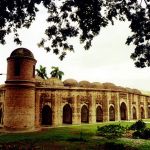The cement industry in Bangladesh has undergone remarkable growth and transformation over the past three decades. Once heavily reliant on imports, the industry has now evolved into a self-sufficient sector, contributing significantly to the country’s infrastructure and economic development. Today, Bangladesh boasts over 35 operational cement manufacturers, collectively producing approximately 78 million tonnes of cement annually, which exceeds domestic demand by around 105% (Source: The Daily Star).
সূচিপত্রঃ
Market Size and Economic Contribution
In 2024, the total market value of the cement industry stood at approximately $4.47 billion, with a projected annual growth rate of 3.5%, bringing the industry’s valuation to $4.63 billion by 2025. Looking ahead, the market is expected to expand further, reaching $5.33 billion by 2028 (Source:Business Wire).
The cement industry is a key player in the national economy, directly employing thousands of workers and supporting a vast supply chain that includes logistics, raw material suppliers, and construction companies. It is closely tied to Bangladesh’s infrastructure development, with government-led mega projects such as the Padma Bridge, Dhaka Metro Rail, and Karnaphuli Tunnel driving sustained demand for cement.
Production and Consumption Trends
Bangladesh’s domestic cement demand was estimated at 50 million tonnes in 2024, with a projected increase to approximately 52 million tonnes by 2025. Despite the overcapacity issue, local consumption remains robust due to rapid urbanization, industrial growth, and large-scale real estate developments (Source: CemNet).
However, the industry faced a significant downturn in 2024 due to multiple economic and political challenges, which affected production levels and sales. Monthly cement sales dropped to just 3.4 million tonnes, reflecting an industry-wide capacity utilization of less than 45%. This underutilization led to increased operational costs for many manufacturers and intensified price competition.
Challenges Faced by the Industry
- Political and Economic Instability
- Political uncertainty and disruptions slowed down major infrastructure projects, leading to delays in cement procurement and reduced demand.
- A weakening Bangladeshi Taka (BDT) led to increased costs for imported raw materials such as clinker, gypsum, and fly ash.
- Overcapacity and Fierce Market Competition
- Bangladesh’s cement industry operates at more than double its current demand capacity.
- This overproduction has led to price wars, squeezing profit margins, particularly for small and mid-sized manufacturers.
- Rising Production Costs
- The cost of clinker, which constitutes 60-65% of cement production costs, rose sharply in 2024 due to global supply chain disruptions.
- Energy expenses have also escalated, with electricity and fuel prices increasing by 15-20% year-on-year, impacting production costs.
- Declining Export Performance
- In the first six months of FY 2024-25, cement export revenues dropped by 27% year-on-year, totaling only $6.62 million.
- The total export revenue for the first eight months of the fiscal year further declined by 28.7%, reaching $8.88 million (Source: CemNet).
- The primary export destinations, including India, Nepal, and Myanmar, have seen increased domestic production, reducing dependence on Bangladeshi cement.
- Environmental and Sustainability Challenges
- Cement production contributes significantly to CO₂ emissions, prompting the need for more sustainable and energy-efficient production methods.
- Stricter environmental regulations may increase compliance costs for manufacturers in the near future.
Future Outlook and Opportunities
Despite these challenges, the long-term outlook for Bangladesh’s cement industry remains positive, supported by key growth drivers:
- Infrastructure Boom
- Large-scale government projects, including the Dhaka-Chattogram Expressway, Payra Seaport, and various industrial zones, will drive cement demand in the coming years.
- Urbanization and Real Estate Growth
- The housing sector continues to expand, fueled by increasing urbanization and a growing middle class.
- The demand for high-rise buildings, shopping malls, and commercial structures will further support cement consumption.
- Investment in Sustainable Production
- Major manufacturers are investing in energy-efficient technologies, including waste heat recovery systems (WHRS) and alternative fuel sources to reduce production costs.
- The industry is also shifting towards blended cement, which is more environmentally friendly and cost-effective.
- Potential for Export Market Expansion
- If production costs can be controlled, Bangladesh could expand its export market to African and Middle Eastern countries where demand for cement is rising.
- Government incentives for exporters could further enhance the sector’s global competitiveness.
Top 10 Cement Brands in Bangladesh
01. Shah Cement:
Shah Cement Industries Ltd., established in 2002, is a prominent cement manufacturer in Bangladesh and a subsidiary of the Abul Khair Group. Headquartered in Dhaka, the company has maintained a leading position in the country’s cement industry for over two decades. Source: en.wikipedia.org
Production Capacity and Facilities
The company’s manufacturing plant is located in Muktarpur, Munshiganj, strategically positioned at the confluence of the Shitolokkha and Dhaleshwari rivers. This facility boasts a production capacity of 10 million metric tons per annum, making it one of the largest cement producers in Bangladesh. Source: thedailystar.net
In 2018, Shah Cement set a Guinness World Record by commissioning the world’s largest vertical roller mill (VRM), supplied by FLSmidth of Denmark. This advanced VRM enables the production of over 15,000 tons of cement daily, ensuring both efficiency and superior product quality. Source: The CEO Magazine
Technological Advancements
Shah Cement has integrated cutting-edge technologies into its operations. The VRM is equipped with Artificial Intelligence (AI) systems, including an Intelligent Monitoring System and Intelligent Knowledge Solution, which enhance automation, reduce waste, increase production, and improve product quality. Additionally, the plant features a multi-compartment silo, allowing for the production of customized cement compositions tailored to the specific requirements of various mega infrastructure projects. Source: en.prothomalo.com
Logistics and Distribution
To ensure timely delivery and maintain product integrity, Shah Cement has developed an extensive logistics network. The company operates a fleet comprising over 700 trucks and 100 vessels, facilitating the prompt distribution of products across Bangladesh. This robust logistics infrastructure enables Shah Cement to fulfill its commitment to delivering products to customers’ doorsteps within 24 hours of order placement. Source: The CEO Magazine
Notable Projects
Shah Cement has been a key contributor to numerous landmark infrastructure projects in Bangladesh, including:
Padma Bridge
Dhaka Metro Rail
Shadhinota Tower in Mohakhali
Moghbazar-Mouchak Flyover
Mongla Food Grain Silo
Rooppur Nuclear Power Plant
Bijoy 71 Hall at Dhaka University
Akhtaruzzaman Flyover in Chittagong
These projects underscore the company’s commitment to supporting the nation’s infrastructure development with high-quality cement products. Source: dhakatribune.com
Awards and Recognitions
Shah Cement’s dedication to excellence has been consistently acknowledged:
The company secured the “Best Brand Award” in the cement category in 2022. Source: thedailystar.net
In 2023, Shah Cement was honored with the Superbrands Award for the third consecutive time, reflecting its strong brand reputation and customer loyalty. Source: images.thedailystar.net
Mission and Vision
Shah Cement aims to be the most trusted and preferred cement brand in Bangladesh, contributing to the nation’s infrastructure development through sustainable and innovative solutions.
Contact Information
Location: Dhaka, Bangladesh
Phone: +880-2-8870422
Email: [email protected]
Leadership
The company is led by Managing Director Abu Sayed Chowdhury, under whose guidance Shah Cement continues to thrive in Bangladesh’s competitive cement industry. Source: en.wikipedia.org
Through its unwavering commitment to quality, innovation, and customer satisfaction, Shah Cement Industries Ltd. has solidified its position as a leader in Bangladesh’s cement sector.
02. Seven Rings Cement
Seven Rings Cement, established in 1999, is a prominent subsidiary of the Hong Kong-based Shun Shing Group. Over the years, it has cemented its position as one of Bangladesh’s leading cement manufacturers, offering a diverse range of products tailored to various construction needs.
Mission & Vision: The company is committed to delivering high-quality cement products that adhere to international standards, aiming to foster sustainable development and ensure customer satisfaction.
Production Facilities: Seven Rings Cement operates multiple state-of-the-art production facilities across Bangladesh:
Kaligonj, Gazipur (Dhaka): Established as Seven Circle Bangladesh Ltd. (SCBL), this factory is situated on the bank of the Shitalakha River, approximately 38 km from Dhaka city. It boasts a production capacity of 1.9 million metric tons per annum, catering to the demands of Greater Dhaka, Mymensingh, Sylhet, and Comilla regions. Source: datanyze.com
Labanchara, Khulna: Launched in 2014 under the name Shun Shing Cement Mills Ltd. (SSCML), this facility is located in the KDA Industrial Area on the bank of the Rupsha River, about 7 km from Khulna city center. It has a production capacity of 1.5 million metric tons per annum, serving the southwestern and northern districts of the country. Source: sevenringscement.com
Chattogram: Another significant production unit contributing to the company’s robust manufacturing capabilities. Source: sevenringscement.com
Dubai, UAE: Expanding its footprint beyond Bangladesh, Seven Rings Cement operates a facility in Dubai, enhancing its global presence. Source: sevenringscement.com
Collectively, these facilities enable the company to produce a total of 9.4 million metric tons of cement annually. Source: sevenringscement.com
Product Portfolio: Seven Rings Cement offers a variety of cement types to meet diverse construction requirements:
Seven Rings Gold (CEM I): A Portland Cement conforming to BDS EN 197-1:2010 CEM I, 52.5N standards. Source: BCMA
Seven Rings Special (CEM II/A-M): A Portland Composite Cement designed to improve concrete durability. It is manufactured by inter-grinding major mineral components like Pulverized Fuel Ash (PFA), Blast Furnace Slag, and Limestone with clinker and gypsum. Source: sevenringscement.com
Seven Rings Cement (CEM II/B-M): Another variant of Portland Composite Cement, catering to specific construction needs. Source: sevenringscement.com
Notable Projects: The company’s cement has been integral to several landmark infrastructure projects in Bangladesh, including:
Hazrat Shahjalal International Airport Terminal 3: Seven Rings Cement is supplying cement for the construction of this new terminal in Dhaka. Source: globalcement.com
Sylhet Osmani International Airport: The company has secured a contract to supply cement for the development of this airport. Source: globalcement.com
Mayor Mohammad Hanif Flyover: A significant infrastructure project in Dhaka built using Seven Rings Cement. Source: sevenringscement.com
Recent Developments:
Dealer Conference 2025: In February 2025, Seven Rings Cement organized a dealer conference titled ‘Durbar Jatrar Sharothi’ at a five-star hotel in Cox’s Bazar. The three-day event saw the participation of 180 distributors from the Dhaka plant, with special performance awards distributed among top distributors. Source: dhakatribune.com
Partnership with BRAC Bank: In December 2024, the company partnered with BRAC Bank to implement advanced cash management solutions, utilizing the bank’s CORPnet platform to optimize financial operations. Source: The Daily Star
Contact Information:
- Location: Dhaka, Bangladesh
- Phone: +880-2-8834324
- Email: [email protected]
With a workforce of approximately 1,500 employees, Seven Rings Cement continues to play a pivotal role in Bangladesh’s construction industry, contributing to the nation’s infrastructure development and economic growth.
03. Fresh Cement
Fresh Cement, a prominent concern of Meghna Group of Industries (MGI), has been a significant player in Bangladesh’s cement sector since its inception in 2001. MGI, established in 1976, is one of the largest conglomerates in Bangladesh, with interests spanning various industries, including Fast-Moving Consumer Goods (FMCG), building materials, pulp and paper, LPG, feeds, fiber, power plants, shipping, seed crushing, chemicals, shipbuilding, dockyard, securities, insurance, media, and aviation. Source: mgi.org
Mission & Vision: Fresh Cement is dedicated to becoming a leading cement manufacturer by ensuring quality, innovation, and sustainability in all operations.
Production Facilities: Fresh Cement operates state-of-the-art manufacturing units equipped with the latest technology to meet the growing demands of the construction sector. In 2020, MGI inaugurated a second manufacturing unit for Fresh Cement, boasting a production capacity of 10,000 tonnes per day, significantly enhancing the company’s ability to serve the market. Source: The Daily Star
Product Portfolio: Fresh Cement offers a diverse range of high-quality cement products tailored to various construction needs. Notably, the company introduced ‘Fresh Ultra Strong Cement,’ the first in Bangladesh to contain extra clinker, ensuring up to 15% more strength. This innovation underscores Fresh Cement’s commitment to setting new standards in the industry. Source: brandpractitioners.com
Recent Developments:
Marketing Initiatives: To promote ‘Fresh Ultra Strong Cement,’ Fresh Cement launched a television commercial featuring Shakib Al Hasan, the renowned captain of the Bangladesh Cricket Team, as their brand ambassador. This campaign highlights the brand’s commitment to strength and resilience. Source: brandpractitioners.com
Dealer Engagement: In 2023, Fresh Cement and Meghnacem Deluxe organized a ‘Dealers’ Conference’ in Pattaya, Thailand, recognizing over 100 top-performing dealers. Such initiatives reflect the company’s dedication to strengthening its distribution network and acknowledging the contributions of its partners. Source: The Daily Star
Industry Challenges: The cement industry in Bangladesh has faced significant challenges due to declining demand and increasing production costs. In 2024, industry sales contracted, leading manufacturers to reduce prices by at least 15% to remain competitive. Mohammed Khurshed Alam, Executive Director of Fresh Cement, highlighted these severe challenges, emphasizing the impact on the overall construction sector. Source: cemnet.com
Contact Information:
- Location: Fresh Villa, House No.15, Road No. 34, Dhaka, Bangladesh
- Phone: +880-2-9887426
- Email: [email protected]
With a workforce of approximately 1,000 employees, Fresh Cement continues to play a pivotal role in Bangladesh’s construction industry, contributing to the nation’s infrastructure development and economic growth.
04. Premier Cement
Premier Cement Mills PLC, established on October 14, 2001, is a prominent cement manufacturer in Bangladesh, recognized for its commitment to quality and customer satisfaction. The company began commercial production on March 12, 2004, with an initial annual capacity of 0.6 million metric tons. Over the years, it has expanded significantly, achieving an annual production capacity of 8 million tons by 2020. Source: Premier Cement
Mission & Vision: Premier Cement aims to lead the cement industry by delivering excellence in production, competitive pricing, and value addition for stakeholders. Source: emis.com
The company emphasizes sustainable growth through quality improvement, innovative practices, and a motivated workforce.
Product Portfolio: The company manufactures European standard cement products, including:
- Portland Cement (PC); CEM I, Strength Class 52.5N: A fine powder produced by grinding clinker (95%) and gypsum (5%), conforming to Bangladesh Standard BDS EN 197-1:2003 CEM-I. Source: Premier Cement
Financial Performance:
- FY2023-24: Premier Cement returned to profitability, posting a profit of Tk 74.23 crore after two consecutive years of losses. Consequently, the company declared a 21.5% cash dividend, its highest in nine years. Source: businesspostbd.com
- Q2 FY2024-25: The company reported a profit of Tk 2.42 crore, marking an 89% year-on-year decline. Earnings per share for October-December 2024 stood at Tk 0.23, down from Tk 2.09 in the same period the previous year. Source: The Daily Star
Management Team:
- Chief Executive Officer: Mohammed Haque
- Chief Financial Officer: Mohammad Reza
- Chief Operating Officer: Tarique KamalSource: MarketScreener
Company Evolution:
- 2001: Incorporated as a private limited company.
- 2010: Converted to a public limited company on April 16.
- 2013: Listed on the Dhaka Stock Exchange on February 11 and the Chittagong Stock Exchange on February 3.
- 2022: Renamed from Premier Cement Mills Limited to Premier Cement Mills PLC on December 1.Source: emis.com
Contact Information:
- Address: TK Bhaban (12th Floor), 13 Kawran Bazar, Dhaka 1215, Bangladesh
- Phone: +880 2 55012191~8
- Email: [email protected]
Premier Cement Mills PLC continues to play a vital role in Bangladesh’s infrastructure development, contributing to numerous mega projects and maintaining a strong presence in both domestic and international markets.
05. LafargeHolcim Bangladesh PLC
LafargeHolcim Bangladesh PLC (LHBL) is a prominent cement manufacturer in Bangladesh, operating as a joint venture between Holcim Group of Switzerland and Cementos Molins of Spain. Established in 1997, the company has invested approximately US$500 million to develop a fully integrated cement plant in Chhatak, Sunamganj, and three grinding stations located in Meghnaghat, Narayanganj, and Mongla, Bagerhat. This investment represents the largest foreign direct investment in Bangladesh’s construction industry.
Mission & Vision: LHBL aims to lead in innovative and sustainable building solutions, contributing to societal progress.
Unique Operations: The company’s Chhatak plant is the only fully integrated cement plant in Bangladesh, producing both clinker and high-quality cement. Additionally, LHBL owns and operates limestone and shale mines in the Nongtrai and Shella areas of East Khasi Hills District, Meghalaya, India, ensuring a steady supply of raw materials. Source: LafargeHolcim Bangladesh, stockanalysis.com
Products and Services: LHBL offers a diverse range of products under the brand names Supercrete and Holcim, including:
- Holcim Strong Structure: Designed for robust construction needs.
- Holcim Water Protect: Specialized for water-resistant structures.
- Holcim Shokti: A rapid-set cement with enhanced early strength, achieving 50% more strength within 48 hours, reducing setting time by 15–25%, and optimizing water requirements. Source: globalcement.com
- Supercrete and Supercrete Plus: Premium quality cement products.
Recent Achievements:
Financial Performance: In 2022, LHBL reported a record profit, with earnings per share (EPS) rising to Tk 3.83 from Tk 3.34 in the previous year. This growth was attributed to the launch of new products and the expansion of waste management services. Source: thefinancialexpress.com.bd
Dividend Declaration: Based on its 2022 performance, LHBL declared a historical high dividend of 48% for its investors. Source: The Daily Star
Awards and Recognitions: The company received the ‘Gold’ Award from the Institute of Cost and Management Accountants of Bangladesh (ICMAB) in October 2024 and from the Institute of Chartered Secretaries of Bangladesh (ICSB) in September 2024, acknowledging excellence in corporate governance and reporting. Source: LafargeHolcim Bangladesh
Sustainable Initiatives: In September 2024, LHBL signed a Memorandum of Understanding (MoU) with PRAN-RFL Group to enhance sustainable waste management practices, reflecting its commitment to environmental stewardship. Source: LafargeHolcim Bangladesh
Contact Information:
- Head Office: 227/A, Bir Uttam Mir Shawkat Sarak, Dhaka, Bangladesh.
- Phone: +880-2-9881002
- Email: [email protected]
With a workforce of approximately 900 employees, LHBL continues to play a vital role in Bangladesh’s construction sector, emphasizing innovation, sustainability, and quality in its operations.
06. Bashundhara Cement
Bashundhara Cement, a subsidiary of Bashundhara Group, stands as a prominent player in Bangladesh’s cement industry. Established on January 15, 1996, Bashundhara Cement operates two manufacturing units under Bashundhara Industrial Complex Ltd., located in Mongla and Madanganj, equipped with advanced Vertical Roller Mill (VRM) technology from Loesche, Germany. Source: bashundharacement.com
Company Overview:
- Parent Company: Bashundhara Group, founded in 1987, has diversified interests spanning real estate, manufacturing, and trading. Source: Wikipedia
- Headquarters: Tower #1, Plot #844, Road #12, Block #I, Bashundhara R/A, Dhaka – 1229, Bangladesh.
- Contact Information:
- Phone: 09666443310-19
- Email: [email protected]
Mission & Vision:
Bashundhara Cement is committed to delivering superior quality cement products that contribute to the sustainable development of Bangladesh’s infrastructure. Source: bashundharacement.com
Product Portfolio:
- Cement Types: Bashundhara Cement offers various cement products suitable for diverse construction needs, including Ordinary Portland Cement (OPC) and Portland Composite Cement (PCC). Source: bashundharacement.com
Major Projects and Achievements:
- Dhaka Elevated Expressway: In May 2024, Bashundhara Cement signed an agreement with the SDRB-Sinohydro JV to supply over 200,000 tonnes of cement for the Dhaka Elevated Expressway PPP project. Source: tbsnews.net
- Other Infrastructure Projects: The company has been a key supplier for significant national projects, including the Padma Bridge, Metro Rail, and various mega infrastructure developments across the country. Source: bashundharacement.com
Recent Developments:
- Capacity Expansion: In September 2020, Bashundhara Group secured an $82 million loan to construct a new 4.0 million tonnes per year cement plant in eastern Bangladesh, primarily targeting export markets in Northeast India. This expansion aims to bolster the company’s production capacity and market reach. Source: globalcement.com
Bashundhara Cement’s dedication to quality and innovation has solidified its position as a leader in Bangladesh’s cement industry, continually contributing to the nation’s infrastructural growth and development.
07. Crown Cement
Crown Cement PLC, formerly known as M.I. Cement Factory Ltd., is a leading cement manufacturer in Bangladesh, renowned for its consistent quality and reliability.
Company Overview
Founding Year: Established on December 31, 1994, Crown Cement has grown significantly over the past decades. Source: Crown Cement
Corporate Structure: Transitioned to a Public Limited Company, reflecting its commitment to transparency and corporate governance. Source: Crown Cement
Headquarters: Located in Dhaka, Bangladesh, serving both domestic and international markets. Source: dnb.com
Contact Information:
- Phone: +880-2-9889363
- Email: [email protected]
Workforce: Employs approximately 800 individuals, contributing to the nation’s economy. Source: dnb.com
Mission & Vision
Crown Cement aims to be a leader in the cement industry by providing innovative products and solutions that meet the evolving needs of customers.
Product Portfolio
Cement Types:
- Portland Cement (PC): Comprising 95-100% clinker and 0-5% gypsum, adhering to BDS EN 197-1:2003 standards.Source: Crown Cement
- Portland Composite Cement (PCC): A blend designed for diverse construction needs.
- Portland Cement (PC): Comprising 95-100% clinker and 0-5% gypsum, adhering to BDS EN 197-1:2003 standards.
Ready-Mix Concrete: Offers ready-mix concrete solutions, equipped with over 95 transit mixer trucks and 24 concrete pumps, including two boom pumps. Source: MarketScreener
Innovative Products: Introduced ‘Izonil’ and ‘Izonil Plus,’ specialized construction materials catering to modern building requirements. Source: stockanalysis.com
Financial Performance
Profitability: Achieved a profit of Tk 1 billion in the fiscal year ending June 30, 2024, driven by increased sales and effective cost-control measures. Source: The Daily Star
Dividend Declaration: Announced a 21% cash dividend for the fiscal year 2023-2024, the highest in eight years, reflecting strong financial health. Source: The Daily Star
Recent Developments
Capacity Expansion: In January 2024, commenced production from Unit 6 at the Munshiganj grinding plant, increasing capacity by 72% to 5.7 million tons per year. Source: globalcement.com
Market Position: Recognized as one of the leading cement manufacturers in Bangladesh, with a strong presence both domestically and internationally. Source: BCMA
Crown Cement’s commitment to quality, innovation, and customer satisfaction has solidified its position as a trusted name in the cement industry.
08. Mir Cement
Mir Cement Ltd., established in 2000 by civil engineer Mr. Mir Zahir Hossain, commenced commercial production in mid-2000. Source: datanyze.com
Over the years, the company has grown into one of Bangladesh’s leading cement manufacturers, known for its commitment to quality and innovation.
Product Range and Quality Assurance
Mir Cement produces two main types of cement:
Ordinary Portland Cement (OPC): This type is widely used for general construction purposes.
Portland Composite Cement (PCC): Known for its durability and strength, PCC is suitable for various structural applications.
The company ensures that its products meet international standards, with rigorous testing and quality control measures in place. Source: BCMA
Production Capacity and Expansion Plans
Initially operating with a capacity of 600 metric tons per day (MT/day) in 2003, Mir Cement expanded to 2,400 MT/day by 2018. In 2023, the company announced plans to further increase its production capacity to 5,000 MT/day by 2024, aiming to meet the growing demand in the construction sector. Source: newagebd.net
Sustainability Initiatives
Demonstrating a commitment to environmental responsibility, Mir Cement has invested in dust control measures to minimize air pollution. The company also avoids coal-based heating systems, reducing its carbon footprint and aligning with global sustainability trends. Source: cemnet.com
Notable Projects
Mir Cement has contributed to several significant infrastructure projects in Bangladesh, including:
Mirpur-Kalshi Flyover
Dhaka Elevated Expressway
Rooppur Nuclear Power Plant
Kachpur Meghna Gomti 2nd Bridge
Hotel Intercontinental (New Block)
Corporate Social Responsibility
Beyond its business operations, Mir Cement actively engages in social initiatives. For instance, the company provided relief materials to flood victims in Rangamati, reflecting its dedication to community support and social welfare. Source: dhakatribune.com
Contact Information
Head Office: House # B-147, Road # 22, Level #04, Mohakhali DOHS, Dhaka – 1206
Phone: +880222289335-9
Email: [email protected]
With a workforce of over 400 employees, Mir Cement continues to play a pivotal role in advancing Bangladesh’s construction industry through quality products and sustainable practices.
09. Akij Cement
Akij Cement Company Limited, a subsidiary of Akij Group, commenced operations on November 3, 2002, with a commitment to delivering superior quality cement to consumers. As a strategic business unit under Akij Resource, the company has established itself as a reliable brand in Bangladesh’s cement industry. akijcement.com
Technological Advancements:
Akij Cement is a pioneer in adopting advanced technologies to enhance product quality. Notably, it was the first in Bangladesh to implement Vertical Roller Mill (VRM) technology, ensuring the production of ultrafine cement ranging from 2 to 50 microns. This innovation underscores the company’s dedication to providing high-quality cement for various construction needs. Source: BCMA
Product Portfolio:
The company offers a diverse range of cement products tailored to meet different construction requirements. Their product line includes:
Portland Cement (CEM-I): Known for its high strength and durability, suitable for general construction purposes.
Portland Composite Cement (CEM-II/A and CEM-II/B): These variants are designed for specific applications, offering enhanced workability and sustainability. Source: akijcement.com
Recent Milestones:
In November 2024, Akij Cement celebrated its 22nd anniversary, marking over two decades of excellence and innovation in the cement industry. The celebration included the launch of an eco-friendly slag-based cement (CEM II/A-M), featuring 80–94% clinker content. This product aims to offer enhanced durability and sustainability, reflecting the company’s commitment to environmental responsibility. Source: akijcement.com
Contact Information:
Address: Akij House, 198 Bir Uttam Mir Shawkat Sarak, Gulshan Link Road, Tejgaon, Dhaka 1208
Phone: 08000016609, 16609
Email: [email protected]
With a workforce exceeding 1,000 employees, Akij Cement continues to uphold the legacy of its founder, Sheikh Akij Uddin, by focusing on quality, innovation, and customer satisfaction. The company’s mission is to become a market leader through strategic marketing and consumer support, aiming to achieve top positions both locally and internationally.
10. Confidence Cement
Confidence Cement PLC, established on May 2, 1991, is a pioneer in Bangladesh’s private cement sector. As the flagship company of Confidence Group, it has grown to become one of the largest cement producers in the country. Source: confidencecement.com.bd
Company Overview:
- Founding Year: 1991
- Headquarters: Confidence Heights, Plot-1, Lane-1, Road-2, Block-L, Halishahar H/E, Agrabad Access Road, Chattogram, Bangladesh
- Contact Information: Phone: +88031-711471-3; Email: [email protected]
- Number of Employees: Over 950
Production Capacity:
The company has an annual production capacity of 1.5 million metric tons, with plants located in Chattogram. Source: confidencegroup.com.bd
Certifications:
Confidence Cement was the first ISO 9002-certified cement manufacturing company in Bangladesh, reflecting its commitment to quality and innovation. Source: confidencecement.com.bd
Mission & Vision:
- Mission: To explore, innovate, design, and engineer best-in-class products and services that bring meaningful impact to people’s lives and communities.
- Vision: To establish all its brands as one of the top three choices in their respective markets by 2030.
Recent Developments:
New Production Facility: In October 2024, Confidence Cement announced an investment of Tk 815 crore to set up a new production facility on 10 acres of land in Narsingdi, aiming to cater to future demand. Source: The Daily Star
Rights Share Issue: In September 2024, the company decided to issue rights shares to raise Tk 1.29 billion for investment in an associate company, Confidence Cement Dhaka, and for repayment of term loans. Source: thefinancialexpress.com.bd
Financial Performance: Despite a revenue drop of 8%, Confidence Cement reported an 83% increase in net profit to Tk 34 crore during the July-September quarter of the fiscal year, attributed to strong earnings in the final quarter (April-June), which is the peak period for the cement business. Source: tbsnews.net
Subsidiaries and Affiliations:
Confidence Cement PLC is part of the Confidence Group, which includes various subsidiaries such as:
- Confidence Ready Mix
- Confidence Infrastructure Limited
- Confidence Steel Limited
- Confidence Batteries Limited
- Asian Paints Bangladesh Limited (a partnership established in 2002)
These subsidiaries enable the group to diversify its offerings across different sectors. Source: Wikipedia
Quality Assurance:
The company maintains the quality of its cement through detailed quality control measures and advanced logistical strategies, ensuring timely delivery to customers. Source: confidencecement.com.bd
Through continuous development and consistent production of high-quality cement, Confidence Cement PLC aims to remain among the top cement manufacturing companies in Bangladesh.
Conclusion
The Bangladeshi cement industry has undergone a remarkable transformation, evolving from an import-dependent sector to a self-sufficient powerhouse with significant export potential. This growth is fueled by rapid urbanization, large-scale infrastructure projects, and strategic investments in cutting-edge manufacturing technology. Industry leaders like Shah Cement, Bashundhara Group, and Akij Group have played a pivotal role in enhancing production capacity, maintaining international quality standards, and expanding market reach.
With government-backed megaprojects such as the Padma Bridge, metro rail, and numerous expressways driving cement demand, the industry is poised for sustained growth. Additionally, Bangladesh’s competitive pricing, strategic geographical location, and efficient logistics have positioned it as a key cement supplier to neighboring countries like India, Nepal, and Myanmar.
As sustainability and innovation take center stage, leading manufacturers are increasingly adopting eco-friendly production methods, energy-efficient technologies, and alternative raw materials to reduce environmental impact. With ongoing infrastructure development, rising per capita consumption, and expanding export opportunities, Bangladesh’s cement industry is set to become a formidable player in the global market, ensuring long-term stability and economic contribution.
FAQs
How many cement companies operate in Bangladesh?
Ans: Currently, there are 42 cement companies operating in Bangladesh, with several major players dominating the market.
What factors should I consider when choosing a cement company?
Ans: Key factors to consider include quality certifications, production capacity, brand reputation, customer service, pricing, and sustainability practices.
Do Bangladeshi cement companies export internationally?
Ans: Yes, Bangladeshi cement companies export to India, Nepal, Myanmar, Sri Lanka, and the Maldives due to competitive pricing and high-quality standards.
What are the major challenges faced by cement companies in Bangladesh?
Ans: Challenges include rising raw material costs, energy price fluctuations, logistical constraints, and increasing competition in the local and export markets.
What makes a cement brand reliable for construction in Bangladesh?
Ans: A reliable cement brand in Bangladesh is determined by quality certifications, strength, durability, consistency, adherence to international standards, customer reviews, and its performance in large-scale infrastructure projects. Leading brands are widely trusted for their superior quality and market reputation.








